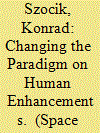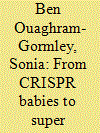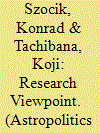| Srl | Item |
| 1 |
ID:
169336


|
|
|
|
|
| Summary/Abstract |
Among the greatest obstacles to the implementation of crewed space missions are human biological limitations. Difficulties were always envisioned in relation to both Earth's moon and Mars but more so for Mars because long spaceflights would also expose crew to prolonged microgravity conditions, in addition to radiation. The result could well be osteoporosis, bone fractures, and disability. In this article, we do not contest the validity of bone loss studies. Rather, we question a seemingly tacit assumption about the immutability of human nature. Indeed, new, invasive, and noninvasive techniques of human enhancement already allow humans to enjoy modifications that will enable lengthy space missions. The alteration of human DNA has not only aided cancer patients but, for example, by using the CRISPR/Cas9 genome editing procedure, can also help to prevent damage to limbs and joints that a prolonged Mars mission could cause for the crew. Possible ethical objections to this solution are discussed, and trade-offs between risks and benefits outlined.
|
|
|
|
|
|
|
|
|
|
|
|
|
|
|
|
| 2 |
ID:
182959


|
|
|
|
|
| Summary/Abstract |
The gene-editing technique CRISPR—clustered regularly interspaced short palindromic repeats—is often depicted as a security threat because it could theoretically allow scientists or amateurs to edit the genome of a variety of organisms and potentially cause harm to humans, plants, and animals. The recent use of CRISPR by Chinese scientist He Jiankui to edit the genome of viable embryos, which resulted in the birth of twin girls, has exacerbated those fears. This article reviews the timeline of the CRISPR-babies experiment, highlights the challenges that contributed to the experiment's failure, and evaluates the risks of CRISPR's use for malevolent purposes. It concludes that although the potential for abuse is great, the technical obstacles are still too significant to allow successful modification that would threaten security.
|
|
|
|
|
|
|
|
|
|
|
|
|
|
|
|
| 3 |
ID:
169972


|
|
|
|
|
| Summary/Abstract |
This paper discusses key issues concerning robotic space missions and human enhancement for purposes of missions to deep space. Effective robotic exploration, especially to deep space, optimally requires advanced artificial intelligence not currently employed. This posits ethical and social challenges in interactions with humans. It is also argued that exploration of deep space by humans ideally requires physiological enhancement of future astronauts. At the same time, progress in space medicine, countermeasures to space radiation, and artificial gravity also provide solutions for deep space human missions. The paper concludes that deep space mission planners seriously account for both advanced robotic artificial intelligence and human physiological enhancement.
|
|
|
|
|
|
|
|
|
|
|
|
|
|
|
|